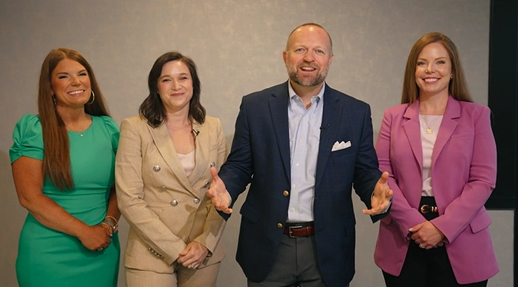A legal battle between two local financial advisory firms has taken a detour into federal appeals court before the original case has even had a chance to fully play out.
Jeremiah Winters, Kate Atwood, Jennifer Thompson, Abbey Sorenson, and their new firm Founder Grove Wealth Partners, filed an appeal earlier this month to challenge U.S. District Court Judge Henry Hudson’s decision to issue an extended injunction that limits their ability to solicit clients from their former employer, Salomon & Ludwin.
That injunction, issued last month, is in place until a final judgment is reached in the initial case.
The injunction prevents the Founders Grove foursome from actively poaching S&L clients, however, it does not prevent them from servicing any clients that have already come over from S&L, nor does it prevent additional clients from moving their accounts to Founders Grove on their own.
Still, in seeking to undo the injunction, the Founders Grove defendants claim Judge Hudson’s ruling is hurting their ability to run their new firm.
“The District Court’s preliminary injunction impedes Appellants’ ability to lawfully conduct their business and earn a living, decreases competition in the industry, infringes upon First Amendment rights by restricting speech, and causes customer confusion in making informed choices,” they argued in a filing in the Fourth Circuit of the U.S. Court of Appeals.
The initial lawsuit has been ongoing since late May, when S&L sued the Founders Grove foursome for allegedly stealing trade secrets and wrongfully soliciting clients after their abrupt resignation days earlier.
They’ve since lured more than 400 S&L client accounts to Founders Grove, amounting to more than $352 million in client assets, according to court records.
S&L had $1.7 billion in client assets under management prior to the defendants’ departure.

Founders Grove Wealth Partners consists of (from left) Jen Thompson, Kate Atwood, Jeremiah Winters and Abbey Sorensen.
S&L has called the foursome’s actions a “brazen and unlawful raid” and alleges violations of the federal Defend Trade Secrets Act, as well as the Virginia Uniform Trade Secrets Act and breach of duty of loyalty for the defendants’ forming their new firm while still employed at S&L.
The crux of the Founders Grove group’s defense hinges on the so-called “Broker Protocol,” a set of industry standards that guide financial advisors when jumping from one firm to another.
They’ve argued in the initial case that the protocol was designed to permit this sort of advisor and client movement and that they followed the provisions of the protocol with each step they took upon leaving S&L. They claim they took only client information that is allowed by that protocol and claim they did not discuss their departure from S&L with clients until after they had formally resigned.
They continue to make that argument in their attempts to overturn the injunction.
“Appellants assert that they have fully complied with the Protocol, which protects new firms and investment advisors during transitions, and therefore, S&L’s claims lack merit,” the appeal states. “Winters and Atwood contend that, as specified in the Protocol, they were authorized to use their respective Protocol List to contact and solicit the clients on their Protocol List to transition their business to Founder Grove.”
The appeal argues that Hudson erred in several “critical ways.”
First, they claim that the judge incorrectly found that the protocol’s ‘raiding’ exception likely applies in the S&L case. Hudson’s injunction order showed he was wrestling with whether the defendants’ departure from S&L constituted raiding. That term is loosely defined in the investment advisory industry but the protocol does provide for an exception if actual raiding is found to have occurred.
Hudson found that the defendants “acted with predation.”
The appeal also argues that the protocol does not apply to Thompson and Sorenson, who work on the admin side of the business and are not investment advisors.
They also disagree with Hudson’s opinion that they took S&L’s confidential information. They maintain that they only took client names, addresses, phone numbers and email addresses, all of which is allowed under the protocol.
S&L claims the foursome had entered into employment contracts that included non-solicitation clauses that supersede the protocol, while the Founders Grove defendants claim the protocol takes precedent over those employment contracts.
The Founders Grove group has asked that the appeals process be expedited and for the case to be heard potentially as soon as Oct. 29-Nov. 1. The District Court case remains pending while the appeal is in process.
The Founders Grove group is represented in the appeal by Richmond attorney Henry Willett of law firm Christian & Barton. Willett also represents them in the District Court case. He declined to comment on the appeal.
Henrico-based S&L was founded in 2009 by Dalal Salomon and Daniel Ludwin after they had spent years as part of Wells Fargo Advisors.
The defendants’ defection to Founders Grove marked the exit of four of S&L’s 12 employees. Winters and Atwood were two of the firm’s four advisors. Thompson and Sorenson were two of its four operations employees.
S&L is represented in the case by a group of attorneys from Washington, D.C. law firm Sheppard Mullin, led by Denise Giraudo.
A legal battle between two local financial advisory firms has taken a detour into federal appeals court before the original case has even had a chance to fully play out.
Jeremiah Winters, Kate Atwood, Jennifer Thompson, Abbey Sorenson, and their new firm Founder Grove Wealth Partners, filed an appeal earlier this month to challenge U.S. District Court Judge Henry Hudson’s decision to issue an extended injunction that limits their ability to solicit clients from their former employer, Salomon & Ludwin.
That injunction, issued last month, is in place until a final judgment is reached in the initial case.
The injunction prevents the Founders Grove foursome from actively poaching S&L clients, however, it does not prevent them from servicing any clients that have already come over from S&L, nor does it prevent additional clients from moving their accounts to Founders Grove on their own.
Still, in seeking to undo the injunction, the Founders Grove defendants claim Judge Hudson’s ruling is hurting their ability to run their new firm.
“The District Court’s preliminary injunction impedes Appellants’ ability to lawfully conduct their business and earn a living, decreases competition in the industry, infringes upon First Amendment rights by restricting speech, and causes customer confusion in making informed choices,” they argued in a filing in the Fourth Circuit of the U.S. Court of Appeals.
The initial lawsuit has been ongoing since late May, when S&L sued the Founders Grove foursome for allegedly stealing trade secrets and wrongfully soliciting clients after their abrupt resignation days earlier.
They’ve since lured more than 400 S&L client accounts to Founders Grove, amounting to more than $352 million in client assets, according to court records.
S&L had $1.7 billion in client assets under management prior to the defendants’ departure.

Founders Grove Wealth Partners consists of (from left) Jen Thompson, Kate Atwood, Jeremiah Winters and Abbey Sorensen.
S&L has called the foursome’s actions a “brazen and unlawful raid” and alleges violations of the federal Defend Trade Secrets Act, as well as the Virginia Uniform Trade Secrets Act and breach of duty of loyalty for the defendants’ forming their new firm while still employed at S&L.
The crux of the Founders Grove group’s defense hinges on the so-called “Broker Protocol,” a set of industry standards that guide financial advisors when jumping from one firm to another.
They’ve argued in the initial case that the protocol was designed to permit this sort of advisor and client movement and that they followed the provisions of the protocol with each step they took upon leaving S&L. They claim they took only client information that is allowed by that protocol and claim they did not discuss their departure from S&L with clients until after they had formally resigned.
They continue to make that argument in their attempts to overturn the injunction.
“Appellants assert that they have fully complied with the Protocol, which protects new firms and investment advisors during transitions, and therefore, S&L’s claims lack merit,” the appeal states. “Winters and Atwood contend that, as specified in the Protocol, they were authorized to use their respective Protocol List to contact and solicit the clients on their Protocol List to transition their business to Founder Grove.”
The appeal argues that Hudson erred in several “critical ways.”
First, they claim that the judge incorrectly found that the protocol’s ‘raiding’ exception likely applies in the S&L case. Hudson’s injunction order showed he was wrestling with whether the defendants’ departure from S&L constituted raiding. That term is loosely defined in the investment advisory industry but the protocol does provide for an exception if actual raiding is found to have occurred.
Hudson found that the defendants “acted with predation.”
The appeal also argues that the protocol does not apply to Thompson and Sorenson, who work on the admin side of the business and are not investment advisors.
They also disagree with Hudson’s opinion that they took S&L’s confidential information. They maintain that they only took client names, addresses, phone numbers and email addresses, all of which is allowed under the protocol.
S&L claims the foursome had entered into employment contracts that included non-solicitation clauses that supersede the protocol, while the Founders Grove defendants claim the protocol takes precedent over those employment contracts.
The Founders Grove group has asked that the appeals process be expedited and for the case to be heard potentially as soon as Oct. 29-Nov. 1. The District Court case remains pending while the appeal is in process.
The Founders Grove group is represented in the appeal by Richmond attorney Henry Willett of law firm Christian & Barton. Willett also represents them in the District Court case. He declined to comment on the appeal.
Henrico-based S&L was founded in 2009 by Dalal Salomon and Daniel Ludwin after they had spent years as part of Wells Fargo Advisors.
The defendants’ defection to Founders Grove marked the exit of four of S&L’s 12 employees. Winters and Atwood were two of the firm’s four advisors. Thompson and Sorenson were two of its four operations employees.
S&L is represented in the case by a group of attorneys from Washington, D.C. law firm Sheppard Mullin, led by Denise Giraudo.




On appeal? So when is a judge qualified to render a decision when a defendant or plaintiff questions the legality of the ruling? When do such appeals end? This could go on for a year if the plaintiffs appeal the overturned ruling. I noticed S&L is sending out more PR emails to its clients. I haven’t been contacted by Founders Grove yet.